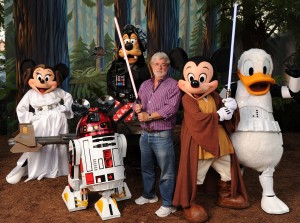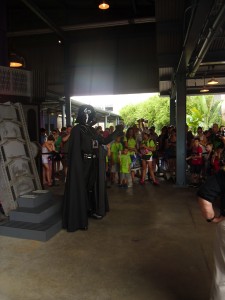When the Magic Kingdom Ate the Galactic Empire
 For many, the announcement of the sale of Lucasfilm to Disney for over four billion dollars may have come as a shock. My feeds were abuzz not only with skepticism for the deal, but with questions about what this means for the larger Star Wars universe. This was especially true of critics, captains of industry and creative types, all of whom weighed in on what this might possibly mean for the series’ continuing relevance, market, including Andrew O’Heir, Alyssa Rosenberg, business types, directors, and other superfans.
For many, the announcement of the sale of Lucasfilm to Disney for over four billion dollars may have come as a shock. My feeds were abuzz not only with skepticism for the deal, but with questions about what this means for the larger Star Wars universe. This was especially true of critics, captains of industry and creative types, all of whom weighed in on what this might possibly mean for the series’ continuing relevance, market, including Andrew O’Heir, Alyssa Rosenberg, business types, directors, and other superfans.
On top of it all, Disney released word that they will be rebooting the franchise – making the sequels for films seven through nine, as well as aggressively merchandising and monetizing all of the Star Wars material through its international distribution wings. Lucas went so far as to say that in another life, Disney might have made the Star Wars franchise, especially given their innovative practices in marketing and monetizing their characters.
For Disney, the deal is a no-brainer. After acquiring Marvel in 2009 (also for $4 billion) we can see how the conglomerate is actively pursuing opportunities to expand its TV, movie and theme park domination, as well as ensuring that they are catering to the purchasing needs and desires of children – especially tween and teen boys. Moreover, the deal gives the studio the ability to market to their parents by way of nostalgia for the cultural touchstones that has always been a key to Disney’s success. The acquisition of Marvel and the Star Wars empires are natural fits for a company that already dominates the tween girls side of the market.
Conglomerates are always on the lookout for any new franchise possibility, which has become ever-important to a studio’s bottom-line. Disney is one of the few studios without a successful live-action franchise, having been burned by their experiments with The Chronicles of Narnia series, their recent attempt at launching a John Carter franchise, and the subsequent flops of both. More importantly, perhaps, Disney has not been successful in generating new intellectual content for some time outside of its TV efforts. Instead, the secret to company’s success in the past 30 years has been acquiring talent and properties through buyouts after a company proves its success, as in the cases of Miramax (1993), The Muppets (2004), Pixar (2006), Marvel (2009) and now Lucasfilm to name only a few of these savvy deals.
For both companies, this is a win-win scenario. For Disney, they get an already tried and true film franchise, and Lucas has already signed off on the sequels and all of the “treasure trove” of spin-off material that he has assembled through the years. For Lucas, he gets to retire, pocket a lot of cash, and divest himself of the responsibility for the Empire (and, if we are to believe him, settle down to make small, experimental movies, as well as to engage in philanthropic enterprises).
 This deal also seems to me to have been in the works for some time now. As someone who has been on multiple trips to Disney’s Orlando parks in the past several years, the shifts in Disney’s Hollywood Studio (formerly Disney’s MGM Studio) has increasingly depended upon Lucas-driven products to fill its park. Facing increasing competition from Universal Studios Orlando (and its Islands of Adventure sub-park, which features Marvel characters – whose licensing will likely have to be renegotiated in the wake of Disney’s takeover of those properties), and having lost the right to use the MGM name, the Hollywood Studio seems to be in the most need of a clear identity within the stable of Disney parks.
This deal also seems to me to have been in the works for some time now. As someone who has been on multiple trips to Disney’s Orlando parks in the past several years, the shifts in Disney’s Hollywood Studio (formerly Disney’s MGM Studio) has increasingly depended upon Lucas-driven products to fill its park. Facing increasing competition from Universal Studios Orlando (and its Islands of Adventure sub-park, which features Marvel characters – whose licensing will likely have to be renegotiated in the wake of Disney’s takeover of those properties), and having lost the right to use the MGM name, the Hollywood Studio seems to be in the most need of a clear identity within the stable of Disney parks.
My guess is that it has been increasingly obvious to the folks at Disney that Star Wars was the property that Disney had always hoped would fill the void here, especially given the complicated licensing of the Marvel characters, and they have already made inroads into producing a revenue stream via their re-vamped Star Tours ride (remade with Lucas’ personal touch) as well as their now-annual Star Wars Weekends.
 Having accidentally attended this year’s incarnation of the Star Wars weekend, one can see the huge potential for both Lucasfilm’s and Disney’s bottom line. The already packed park was super-packed with patrons, all of whom were able to interact with incredibly authentic characters from the films as well as purchase products ranging from lightsabers to full-sized reproductions of themselves in carbonite.
Having accidentally attended this year’s incarnation of the Star Wars weekend, one can see the huge potential for both Lucasfilm’s and Disney’s bottom line. The already packed park was super-packed with patrons, all of whom were able to interact with incredibly authentic characters from the films as well as purchase products ranging from lightsabers to full-sized reproductions of themselves in carbonite.
To me, one of the more interesting things about the announcement was the way that fans and internet types went ahead and started mashing up the images from the two corporations. However, this seems to me to be a case of where Disney is actually well ahead of the game, having already married their characters and properties to the Star Wars merchandise, as seen in some of these various combinations.
More to the point, all of these wares are on sale in “Darth’s Mall” during the weekend and the sheer variety of products can be seen in this fan video:
While there have been various reactions throughout the twitter-sphere, for fans, this is definitely a win. There is already speculation as to what the content of the new films will be, and I think that most people will agree that getting Lucas away from the tight reins of control is probably beneficial to everyone – especially anyone looking forward to innovative new works in the ever-expanding Star Wars universe. No matter what ends up happening, we are clearly in for another wave of hype, which is perhaps the most valuable commodity that Disney bought in this transaction.



Colin, you bring up many good points. I guess I wonder how much of a deal this is for Lucasfilm employees, as the company is currently located in Marin County, about 9 – 10 hours north of Burbank, where Disney’s studios and headquarters are. Yes, Lucas himself may be getting a sweet deal, but the other employees, especially those below the line, have no guarantee that Disney will not relocate them to the LA area, which would be devestating to Marin County’s economy, as well as its media production community.I also wonder how these employees will make sense of their new position as Disney employees. Disney has a horrible reputation among below-the-line media workers, I once saw a sign up on an editor’s office “Those who God wishes to destroy, he first has Disney employee.” I would imagine that in comparison, employees might make sense of their professional identities working for Lucasfilm perhaps through the sort of masculine, maverick auteur persona that is discursively attached to George Lucas and his company. I guess I also wonder what this move means logistically and legally for fans. Disney is much tighter with intellectual property, and I am doubtful if fan productions, like Star Wars Uncut, and others, would have been allowed under Disney, or will be in the future. And similar to the shift in how employee identification might shift after this acquisition, I wonder how fan identity might shift, at least among some communities of hard core Star Wars fans, who may resent “their” franchise becoming part of the Disney family friendly universe.
As always your observations are astute and well balanced Colin. I think everyone agrees that Lucas’ stranglehold on the creative processes behind SW has lead to some visually stunning but otherwise unengaging films. I suppose Disney won’t give John Woo a try, how sad. ON the flipside, I’m sure many fans also cringe as Disney’s tentacles further extend its monopoly over entertainment. They’re becoming as ubiquitous to popular film as microsoft is to PC’s.
Anyway, for myself the most significant aspect of the takeover is the now increased savagery with which lawyers (Disney’s in particular being even more ferocious than Lucas’) will protect copyrights. Thus, my dream funeral ie. being burnt atop a funeral pyre in a Darth Vader costume, would probably bring about horrendous legal reprecussions for my funeral planner. Sigh. Maybe Kim Dotcom can find a way to steal Star Wars too. Cheers.
[…] latest online post – When the Magic Kingdom ate the Galactic Empire – recently appeared in Antenna – Responses to Media and […]